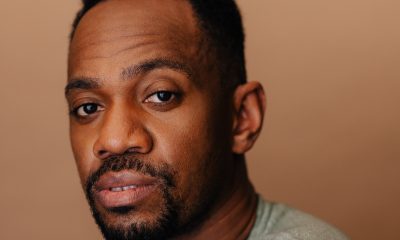a&e features
Kathleen Turner tackles ‘Magical Thinking’
Stage and screen icon channels Joan Didion in new Arena Stage production
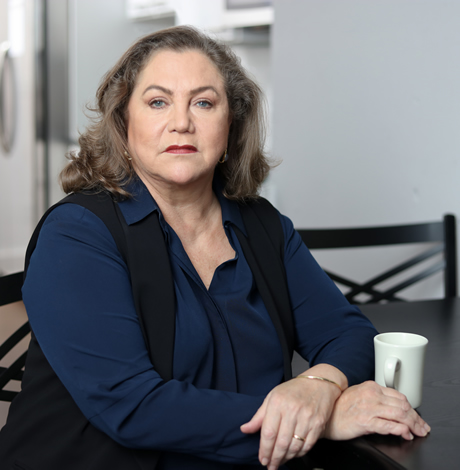
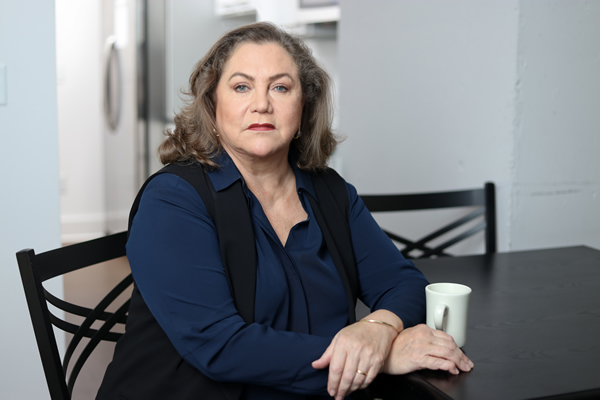
Kathleen Turner as Joan Didion in ‘The Year of Magical Thinking’ at Arena Stage. Turner says the work helped her deal with the loss of her mother. (Photo by Tony Powell; courtesy Arena Stage)
‘The Year of Magical Thinking’
By Joan Didion
Arena Stage
Arlene and Robert Kogod Cradle
1101 Sixth St., S.W.
Oct. 7-Nov. 20
$40-90
Kathleen Turner has done one-woman plays before — she played Tallulah Bankhead in “Tallulah” in 2000-2001 and the title role in “Red Hot Patriot: the Kick-Ass Wit of Molly Ivins” at Arena Stage in 2012.
But this time, it’s different. For her latest production — Turner has become almost as well known in recent years for her stage work as her film roles, which date back to 1981’s “Body Heat” — Turner will play legendary author Joan Didion, whose stunningly frank 2005 memoir “The Year of Magical Thinking” told of the aftermath of the loss of her husband, the author John Gregory Dunne who died suddenly in 2003.
The “magical thinking” of the title refers to the phenomenon of the mind in deep stages of grief where rational thought is sometimes circumvented as a coping mechanism. Didion wrote that at times she felt she couldn’t give away Dunne’s shoes, for surely he’d need them upon returning. Didion won the National Book Award in 2005 for the book, something of a career capstone for the author, known for California-centric writing in works like “Slouching Towards Bethlehem” and “The White Album” as well as screenplays she wrote with Dunne.
Didion adapted the book to the stage in 2007 with Vanessa Redgrave. Turner spoke to the Blade last week by phone from Washington where she was in early rehearsals for the Gaye Taylor Upchurch-directed Arena version.
WASHINGTON BLADE: Tell us how you discovered this work and how things are going so far.
KATHLEEN TURNER: We’ve only had one full-day rehearsal, so I think it’s much too soon to say how anything’s going although we had a very nice open reading, just a table reading, the first day that I enjoyed. I was aware of the book, you know, years ago when it was published but I had not thought of it or seen it as a play at all and then I was, well, my mother passed, my mother died last year and it was, oh, it was a life-changing experience. We were close. We had a really wonderful relationship and I knew how much I would miss her. So trying to figure out how all that was going to change, what I could do, how I could handle it and then, of course, I had thought again of “The Year of Magical Thinking” and went back to look at it and discovered the play version and thought, “Well, this is really what I want to put my heart into now.”
BLADE: How old was your mom?
TURNER: Ninety-three so we had a good long time together.
BLADE: Have you met Joan Didion?
TURNER: Yes, I have met Joan over the years. I’ve been in New York and in this business for a very long time now. I think next year will be 40 years that I’ve been doing this professionally. But she’s very frail now. She’s not very well. She won’t be involved, I’m sorry to say, with this.
BLADE: I’ve never met her but she strikes me as very small. A bit of a waif, perhaps, even when she was younger.
TURNER: Oh, not the woman’s mind, honey. No, no, no. This is one of the strongest minds, with the most ruthless thinking. I mean, she’s so clear headed. She says, “To say this correctly and to some of us, myself included, correctness is a big ego point.” She’s very specific. It’s so amazing to see this brilliant mind who locks down details and chooses words so specifically, so exactly, that this mind could adapt and adopt a whole other way of thinking, of reality, it’s extraordinary.
BLADE: I was thinking more in physical terms. She seems rather demure and you seem so formidable. I only know the book, but it doesn’t strike me as obvious casting.
TURNER: Well certainly physically we’re not at all alike. She’s a tiny little thing, but this is not an imitation. I’m not pretending to be Joan Didion in that way. I just don’t really understand. You think I’ll be less believable for that reason? That they’ll expect to see some little waif?
BLADE: No, I just wondered if that sort of factored into your approach at all or where your head is in tackling this.
TURNER: No. I don’t think of Joan’s physicality at all.
BLADE: Great books don’t always adapt well to the stage. How do you feel this adaptation works?
TURNER: No, not necessarily at all, do they. I think the biggest challenge for this, of course, is the incredibly specific word choices that she makes. I really don’t want to fall into any pattern of approximation, of saying words like the words she chose. This is a huge challenge because there’s so much material but I believe there’s a real reason for her word choices. And part of the thing about magical thinking is that it doesn’t really make sense, some of it. It’s not exactly logical, so to follow it, to follow this path of thinking sometimes is a bit challenging.
BLADE: How does it feel returning to Arena?
TURNER: I love being back here, I really do. It’s just such high quality and I love the people. The production values are great, the people are terrific to work with. I actually really like Washington these days. And I’m happy to be here during the election season so that on my days off or during my days once we’re in performance, I might be able to, oh, I don’t know, raise a little hell you know?
BLADE: What was it like doing Molly Ivins during the last election cycle? That must have been fun.
TURNER: Oh, it was great are you kidding? We had to keep cramming in I don’t know how many seats we actually got into the theater. I think we broke all records and had to extend the run as I recall. It was great. I had a ball doing it.
BLADE: Are D.C. audiences different in any perceptible way?
TURNER: One of the things I’ve noticed over the years is that D.C. audiences seem more integrated. I see more non-white, or whatever the correct wording would be, than I do in a lot of other theaters. I like that. It’s a professional class and not based on race.
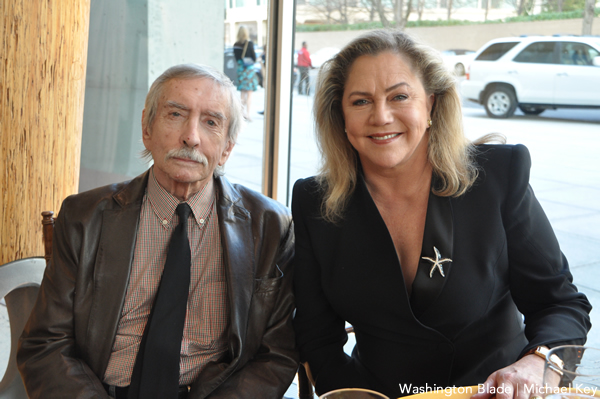
Edward Albee with Kathleen Turner in Washington in 2011. Albee said Turner brought Martha in his play ‘Virginia Woolf’ alive in a way he hadn’t felt since Uta Hagen originated it in the ‘60s. (Washington Blade file photo by Michael Key)
BLADE: I’m almost certain you’re supporting Hillary, right?
TURNER: Of course I’m supporting Hillary. Anything else I think is absolutely unthinkable. I think she’ll be an extraordinary executive in chief. She’s proven that. It’s just such a bizarre time. I just read a wonderful column in the New York Times — I’m trying to think if it was David Brooks or who it was — but the point that seemed so perfect to me was that you can take a die-hard Donald Trump supporter and say, “Donald Trump said this, but here are the actual facts. You know, this is absolutely incorrect. It’s absolutely a lie” and the Trump supporter would probably say, “Well, I don’t feel it’s a lie.” Somewhere along the way in our time, how you feel became just as important as the actual facts or even the idea that they are equatable, you know? I just find that extraordinary, but it’s the only explanation I think.
BLADE: So is that a manner of magical thinking of its own perhaps? Is there a correlation there?
TURNER: There may be. But if you follow Joan’s path of coping, she exposes it to us as magical thinking and there I think is the difference because I don’t think they know they’re doing any sort of magical thinking.
BLADE: Where were you when you heard about the Supreme Court ruling on same-sex marriage last year and how did you feel?
TURNER: I was home in New York City. I’m on the board of People for the American Way for, I think, 31 years now I’ve been working with them and we had a large effort out country wide to support this decision. It was thrilling. Absolutely thrilling.
BLADE: Does any filming experience stand out in your mind as especially memorable?
TURNER: Oh darling, all these years (laughs). Well I always used to love, before I got rheumatoid arthritis, I used to love doing as much of my own stunts as they would allow. I was always just throwing myself around. I always enjoyed things like the adventure films, you know. Things like “Romancing the Stone” or something, they were just such fun for me.
BLADE: How is your daughter and what is she doing these days?
TURNER: She is very well, thank you for asking. She has decided to go back to school and work on pre-law, she says.
BLADE: The line in “Serial Mom” where you berate the woman for her white shoes has become such a gay quotable line. How do you really feel about white shoes after Labor Day?
TURNER: (laughs) Actually no, I won’t wear white shoes after Labor Day. But more than that, I won’t wear white shoes period. I think it’s kind of upstaging. I don’t want people looking at my feet. I just don’t think they’re classy, frankly.
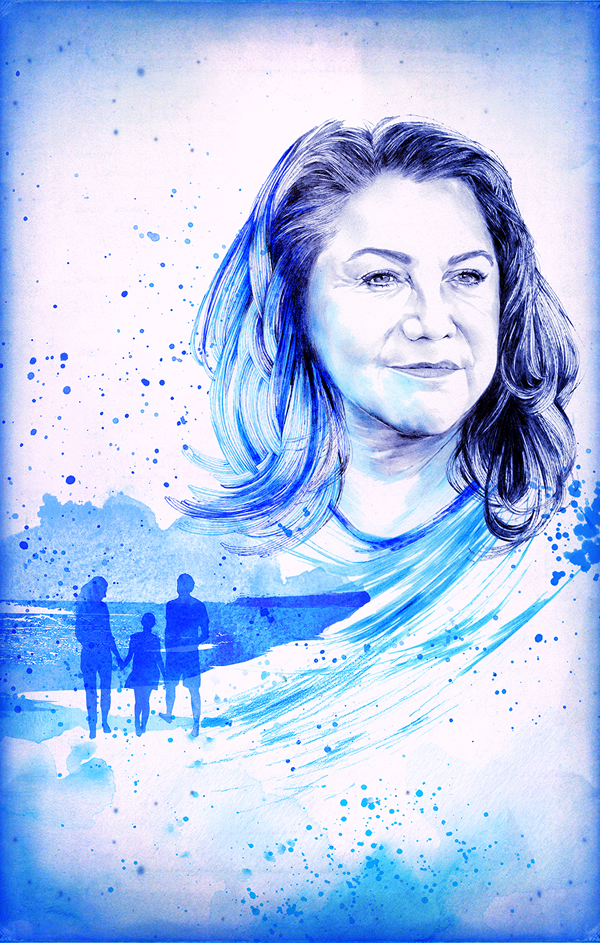
An illustration for Arena Stage’s production of ‘The Year of Magical Thinking’ starring Kathleen Turner as Joan Didion. (Illustration by Montse Bernal; courtesy Arena Stage)
a&e features
Have yourself a merry John Waters Christmas
Annual holiday show returns to Alexandria and Baltimore
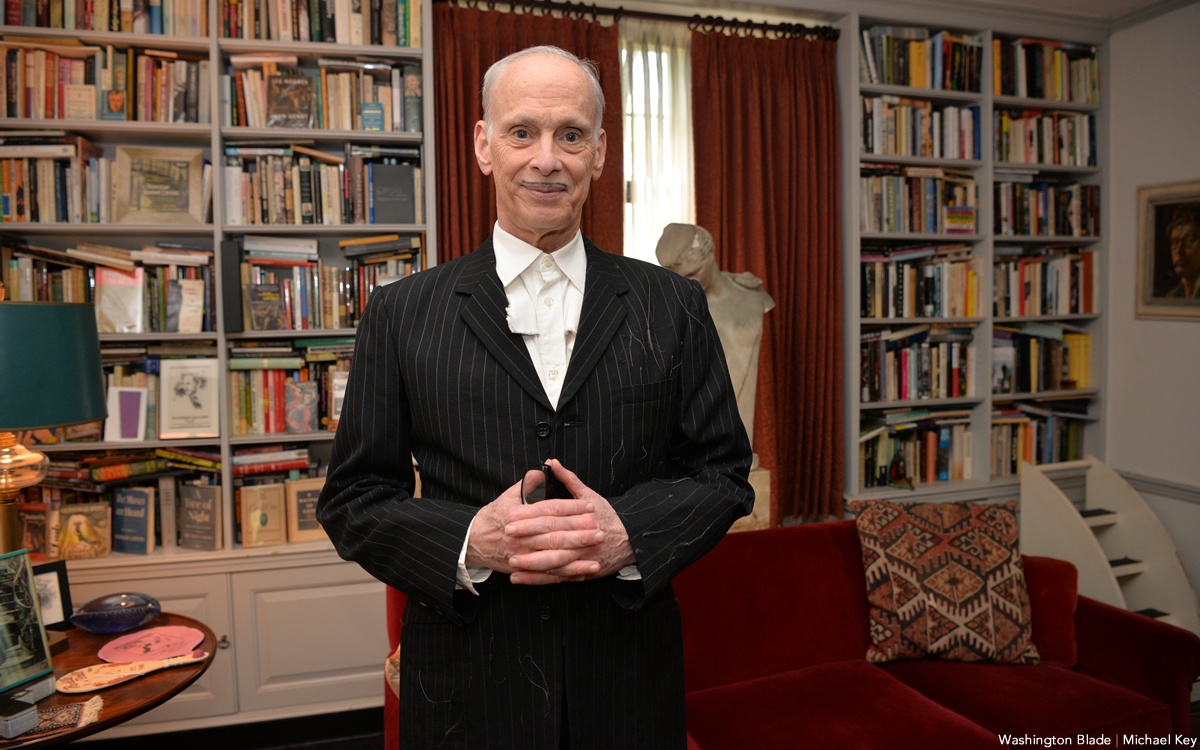
When it comes to iconic Christmas scenes in movies, none can top the tree-toppling tantrum thrown by cha-cha heels-deprived Dawn Davenport in John Waters’s fifth full-length feature “Female Trouble” from 1974. Therefore, it’s not surprising that Waters continues to make art out of Christmas, performing his spoken word Christmas tour in cities across the country. Waters has even more reason to celebrate with the release of his new red vinyl 7” single, a cover of Little Cindy’s “Happy Birthday Jesus (A Child’s Prayer)” on the A-side, and “A Pig Latin Visit From St. Nicholas” on the B-side. If you’re still looking for unique Christmas gifts, consider this record. As always, John was kind enough to make time for an interview in advance of his tour dates.
BLADE: John, in preparation for this interview with you, I went back and listened to Little Cindy’s original rendition of “Happy Birthday Jesus (A Child’s Prayer)” on your “A John Waters Christmas” CD.
JOHN WATERS: One thing I did, if you notice, I make the same stumble in my recording that she did in the original.
BLADE: It sounded to me like she got choked up.
WATERS: No, I think she just stumbles over a word, so I stumbled over the same word. It’s appropriation, insanely.
BLADE: Is this a song you first became aware of in your youth or when you were an adult?
WATERS: When I was doing the Christmas album, I had this friend named Larry Benicewicz. He was kind of my idea man with music. He knew every single old record. I would say to him, “Weird Christmas songs,” when we were doing a soundtrack, or a song about bears, or a song about this, and he would give me all these tapes. It was one of the ones he played for me. A lot of the songs I put in my movies and on my records, I did know as a kid. I did not know this one, but I immediately embraced it. I don’t think it’s campy. I think it really is spiritual in a weird way. My doing it makes it a novelty record. I am really for novelty records, and there aren’t any anymore. Why was there not a COVID novelty record? That’s insane. The dance “The Bug” that’s on the “Hairspray” soundtrack would be perfect for COVID.
BLADE: The thing that struck me was that for a Christmas song in the voice of a child, a kind of death pall hangs over it, with lines like, “If I was good you’d let me live with you” and “they nailed you to the cross, they wanted you to die.”
WATERS: All of it! When I see children at midnight mass kneeling in front of a nude man nailed to a cross, I feel like I’m at The Eagle! It is S&M, it’s creepy. I took the same cover (photo) from her record to parody and put my face on it. The same thing I did with The Singing Dogs last year when I covered (their version of) “Jingle Bells.” I’m really into novelty records. I love them and I’m trying to bring them back. I don’t expect anybody to ever play these records. Even The Singing Dogs one said on it, “Please do not play this record” [laughs]. And the flipside, the Pig Latin version, is almost impossible to listen to.
BLADE: I’m so glad you mentioned that. “A Pig Latin Visit From St. Nicholas” reminded me of the lost art of speaking in Pig Latin. I also recall watching the PBS series “Zoom” as an adolescent and learning to speak “ubbi dubbi,” a distant relative of Pig Latin. Do you think that the time is right for a Pig Latin or ubbi dubbi revival?
WATERS: Here’s the thing, I never could pick up any language, except Pig Latin. I’ve been in every foreign country. Foreign countries have given me money to learn to speak the language. I can never do it! But Pig Latin…my parents and other parents in the ‘50s spoke Pig Latin so kids couldn’t understand what they were saying. Then my mother taught it to me, and I used it. The hardest take to shoot in “Pink Flamingos” was not eating the dog shit. It was when the cast skipped, in one take, saying “E-way, are-yay e-they ilthiest-fay eople-pay in-hay e-they ole-hay ide-way orld-way.” We’re the filthiest people in the whole wide world in Pig Latin. We had to do so many takes so they could do it once without screwing it up. In “Polyester,” Edith (Massey) answers the phone, “ello-hay.” I did a photo piece where it was all subtitled in Pig Latin. Like “osebud-Ray” (from “Citizen Kane”) or in “Streetcar,” “ella-Stay!” [Laughs] All the iconic dialogue translated into Pig Latin. My assistant who helped me do it, had never heard of Pig Latin. She really got good at it because she lived in many foreign countries and can pick up languages. But it’s not that easy to do it correctly and read it. Your computer will translate into Pig Latin.
BLADE: AI understands Pig Latin?
WATERS: I guess that’s AI. It wasn’t 100% right, but it was close. I can speak it if I look at it, but just do a bit at a time. It was a challenge that no one would possibly care about or want to do.
BLADE: I think you pulled it off very well.
WATERS: If you want people to leave on Christmas morning, you put it on. That’s how you get your guests to leave. It’s time to go.
BLADE: Ood-gay i-bay! How did your relationship with record label Sub Pop, which released 2021, 2022, 2024, and new 2025 holiday singles, come about?
WATERS: I believe the first thing I did for them was “Prayer to Pasolini.” They came to me through Ian Brennan. He’s won a couple Grammys for World Music, but he is also is one of my agents who does the Christmas tour and a lot of my shows, anything with music. He helped me arrange each one of the songs. He had a relationship with Sub Pop. It was perfect. My friends in Baltimore, (the band) Beach House, have had huge success.
BLADE: That’s right, they’re on Sub Pop!
WATERS: Yes! I’m happy to be on it. I’ve even been to the warehouse and posed for pictures like Jackie Suzanne used to do.
BLADE: Is there any chance that “A John Waters Christmas” might be reissued on vinyl by Sub Pop?
WATERS: No. It’s such a nightmare to get the rights and to renew them. You have to find the publisher and the writer, and they usually hate each other. It doesn’t matter if it’s obscure or famous, it’s hard to get. You have to make the deal. The singer doesn’t get anything unless they play it on the radio. It would be so complicated legally, and there would be such a [laughs] tiny audience for it. I hope it will come out again. The same thing with the one for Valentine’s Day. I had two of them that did quite well when they came out; “A Date With John Waters and “A John Waters Christmas.” The “John Waters Christmas” album is still the soundtrack that plays whenever I’m doing my spoken word Christmas show as people are entering the theater.
BLADE: Aside from your annual Christmas show tour, what else do you do for the holidays now, and are there any traditions that you’ve carried over from your family?
WATERS: Certainly! I have two sisters, my brother’s widow, and me, so there are four and we take turns each year to have the Christmas dinner. Mine was last year. An entire sit-down dinner. Mom’s China, the silverware, the entire full dinner. It’s pretty traditional. I don’t have a Christmas tree, but I do decorate the electric chair from “Female Trouble.” That is a tradition in my family. We do have Christmas decorations, but they’re usually weird ones that fans sent me. I have one with Divine knocking over the Christmas tree, and the Christmas tree lights up, all sorts of amazing things. There is definitely a tradition here that might be a little altered, but it is definitely a tradition. I used to have a giant party every year, but COVID ended that. I still wouldn’t want 200 people in my house breathing right now.
BLADE: I was looking at your tour schedule and wondered if there are any new cities in which you’ve never performed the John Waters Christmas show that have been added to this year’s schedule?
WATERS: I don’t think there’s a city in America in which I haven’t done one show! The only places I haven’t been to are Hawaii and Alaska. I could do it there, but it’s too long on a tour. I can’t think of a city I haven’t played in in America over the last 50 years. The Christmas show is completely different every year. It doesn’t matter if you saw it last year.

Some gifts scream practical, others whisper luxury, and a few flat-out blur the lines. From cocoa that feels ceremonial to a cologne that linger like a suggestive smirk, this year’s ultimate gift picks prove that thoughtful (and occasionally naughty) presents don’t have to be prosaic. Welcome to your holiday cheat sheet for festive tangibles that get noticed, remembered, and maybe even result in a peck of gratitude planted under the mistletoe. Consensually, of course.
Amber Glass Champagne Flutes
Pop the champs – but make it vintage. These tulip-shaped stunners in amber-tinted glass bring all the Gatsby vibes without the Jazz-age drama. Whether you’re toasting a milestone or celebrating a Tuesday, their seven-ounce capacities and hand-wash-only care make ‘em as practical as they are pretty. Pair with a thoughtful bottle of bubs and gift with a glittering wink. $18, NantucketLooms.com
Disaster Playbook by Here Comes the Apocalypse
Because the end of the world shouldn’t be a solo act, this spiral-bound guide is your step-by-step roadmap to surviving and thriving when everything else goes sideways, which might be sooner than you think. Packed with checklists, drills, and a healthy dose of humor, it’s like a survival manual written by your most prepared (and slightly snarky) friend. Whether you’re prepping for a zombie apocalypse or, more realistically, REVOLUTION!, this playbook’s got your back. $40, HereComesTheApocalypse.com
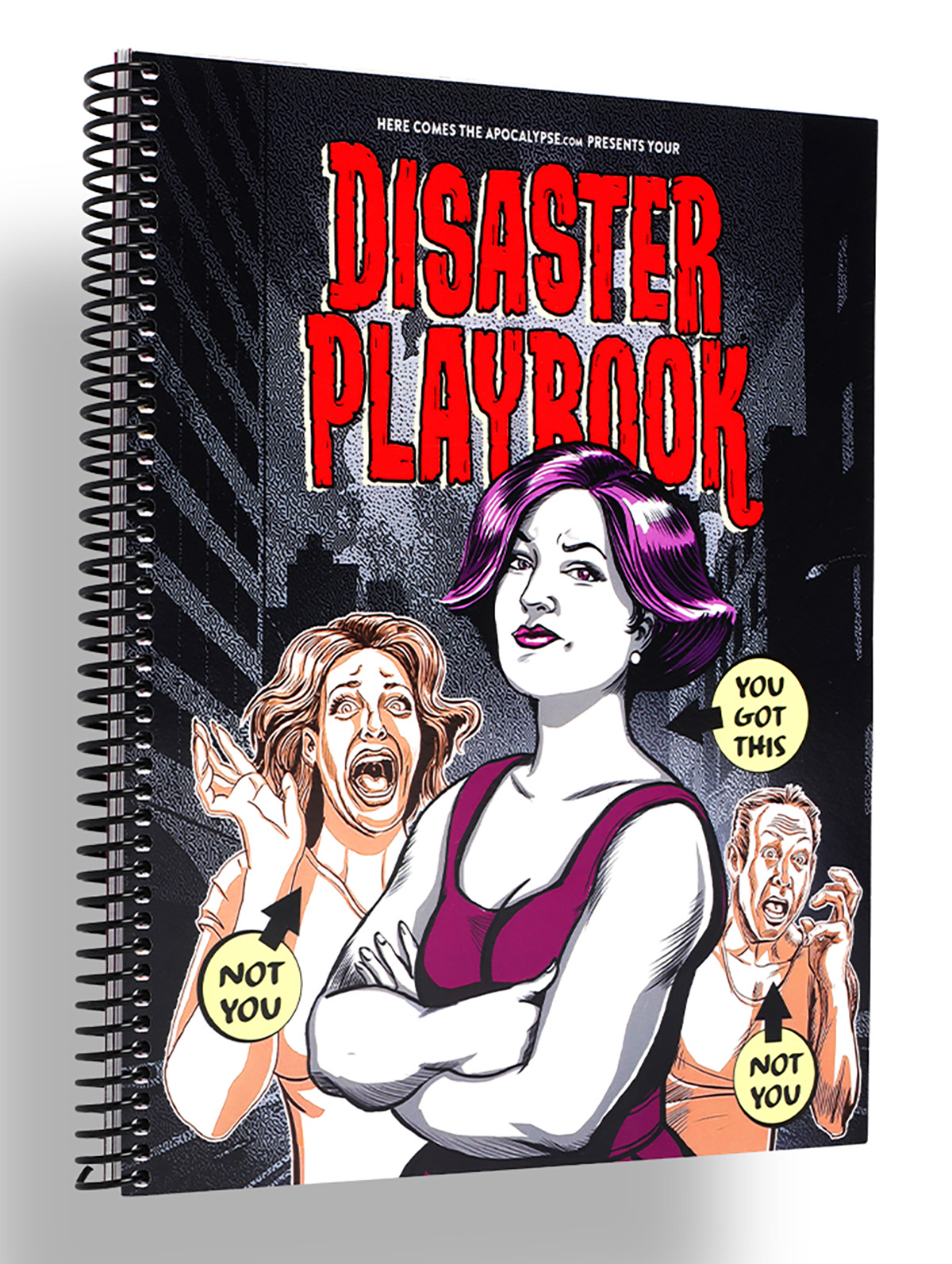
Wickless Vulva Candles
Bold, luxurious, and completely flame-free, CTOAN’s wickless candles melt from beneath on a warmer, releasing subtle, sophisticated fragrances, like sandalwood or lavender. The vulva-shaped wax adds a playful, provocative element to any space –perfect for a bedroom, living room, or anywhere you want elegance with an edge. A gift that celebrates form, intimacy and self-expression, no fire required. $39, CTOANCO.com
Villeroy & Boch Royal Classic Christmas Collection
Every meal is a mini celebration – with whimsy at every place setting – in Villeroy & Boch’s Royal Classic festive dinnerware collection that hits all the right notes. Made from premium German porcelain, it features nostalgic little toys, nutcrackers, and rocking horses in delicate relief, giving your holiday spread a playful but refined twist. Dishwasher- and microwave-safe, it’s luxe without the fuss. Gift a piece to a special someone, or start a collection they’ll use (and show off) for years to come. $22-$363, Villeroy-Boch.com
Greenworks Electric Lawnmower
You a ’hood queen who considers lawn care performance art – or just wants to rule the cul-de-sac in quiet, emission-free glory? Greenworks’ zero-turn electric mower has the muscle of a 24-horsepower gas engine but none of the fumes, drama or maintenance. Six 60V batteries and a 42-inch deck mean you can mow up to two-and-a-half acres on a single charge – then plug in, recharge, and ride again. It’s whisper-quiet, slope-ready, and smooth enough to make you wonder why you ever pushed anything besides your queer agenda. The perfect gift for the homeowner who loves sustainability, symmetry, and showing off their freshly striped yard like that fresh fade you get on Fridays. $5,000, GreenworksTools.com
Molekule Air Purifier
For the friend who treats their space like a sanctuary (or just can’t stand sneezes), the Molekule Air Pro is magic in motion. Covering up to 1,000 square feet, it doesn’t just capture allergens, VOCs, and smoke – it destroys them, leaving your air feeling luxury-clean. FDA-cleared as a Class II medical device, it’s serious science disguised as modern design. Gift it to your city-dwelling, pet-loving, candle-burning friend who likes their living room as pristine as their Instagram feed. $1,015, Molekule.com

Cipriani Prosecco Gift Set
Effervescent with stone-fruit sweetness and a touch of Italian flair, the Cipriani Bellini & Prosecco gift set brings brunch-level glamour to any day of the week. The Bellini blends rich white-peach purée with sparkling wine, while the dry ’secco keeps things crisp and celebratory. Pop a bottle, pour a flute, and suddenly winter weeknights feel like a party – even with your pants off. $36, TotalWine.com
Woo(e)d Cologne
British GQ recently crowned Woo(e)d by ALTAIA the “Best Date Night Fragrance,” and honestly, they nailed it. Confident without being cocky – smoky gaïac and Atlas cedarwood grounds the room while supple leather and spicy cardamom do all the flirting – it’s a scent that lingers like good conversation and soft candlelight. Gift it to the one who always turns heads – or keep it for yourself and let them come to (and then on) you. $255, BeautyHabit.com
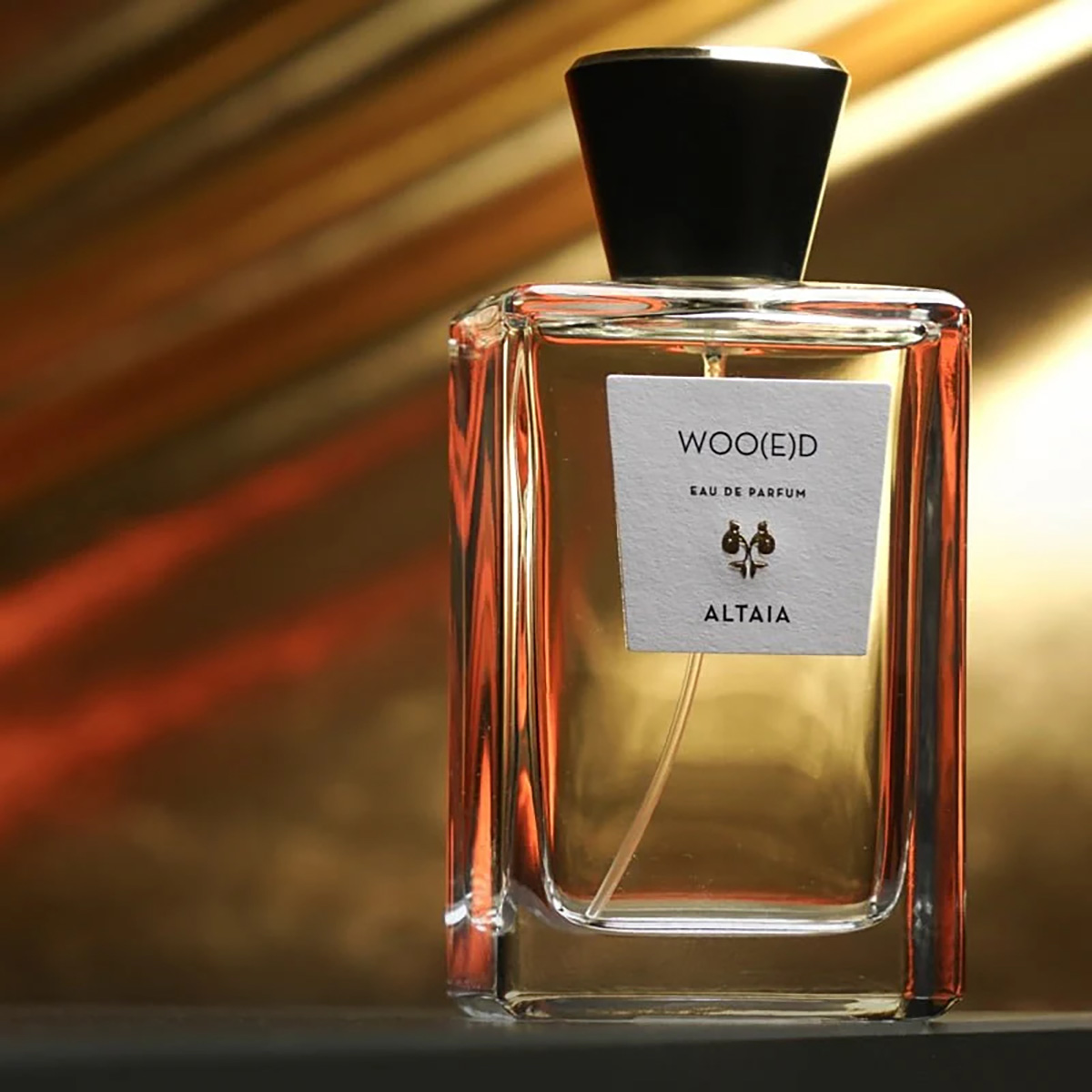
Lococo Cocoa Kit
Keep the run-of-the-mill mugs in the cabinet this Christmas and pull out Lococo’s handcrafted Oaxacan versions that demand you slow down and sip like it matters. Paired with a wooden scoop, rechargeable frother, and Lococo’s signature spice hot-chocolate blend (vegan, gluten-free, with adaptogenic mushrooms), this holiday kit turns Mexi-cocoa into a mini ritual you’ll look forward to. Perfect for anyone who loves a little indulgence with a side of ¡A huevo! energy.
Manta Sleep Mask
Total blackout, zero pressure on the eyes, and Bluetooth speakers built right into the straps, this ain’t your mama’s sleep mask — but it could be. The Manta SOUND sleep mask features C-shaped eye cups that block every hint of light while ultra-thin speakers deliver your favorite white noise, meditation, or late-night playlist straight to your ears. With 24-hour battery life, breathable fabric, and easy-to-adjust sound, it turns any bed (or airplane seat) into a five-star sleep suite. Perfect for anyone who treats shut-eye like an art form (or just wants to escape their roommate’s late-night bingin’ and/or bangin’). $159, MantaSleep.com

Shacklelock Necklace
Turn the industrial-chic vibe of a shackle into a sleek statement. Mi Tesoro’s platinum-plated stainless-steel necklace sits on an 18-inch wheat chain, featuring a shackle-style latch pendant that’s waterproof, tarnish-free, and totally fuss-les. Beyond style, it nods to a classic gesture in the queer leather community: replacing a traditional Master lock with something elegant to quietly signal belonging to someone special. Wear it solo for a minimalist edge or layer it like you mean it; either way this piece locks in both your look and your intentions. $90, MiTesoroJewelry.com
Parkside Flask Mojave Edition
Wine nights get a desert glow-up with Parkside’s limited-edition 750-milliliter all-in-one flask draped in sun-washed bronze and badland hues like sage, sand, and terracotta – with magnetic stemless tumblers that snap on for effortless shareability. It keeps your vino chilled for 24 hours, pours without drips (no tears for spilled rosé, please), and even lets you laser-engrave your own mantra or inside joke. Perfect for picnics, surprise rooftop clinks, or gifting to your favorite wine (or desert) rat. $149, HighCampFlasks.com

Mikey Rox is an award-winning journalist and LGBT lifestyle expert whose work has published in more than 100 outlets across the world. Connect with him on Instagram @mikeyroxtravels.
a&e features
Meet Mr. Christmas
Hallmark’s Jonathan Bennett on telling gay love stories for mainstream audiences
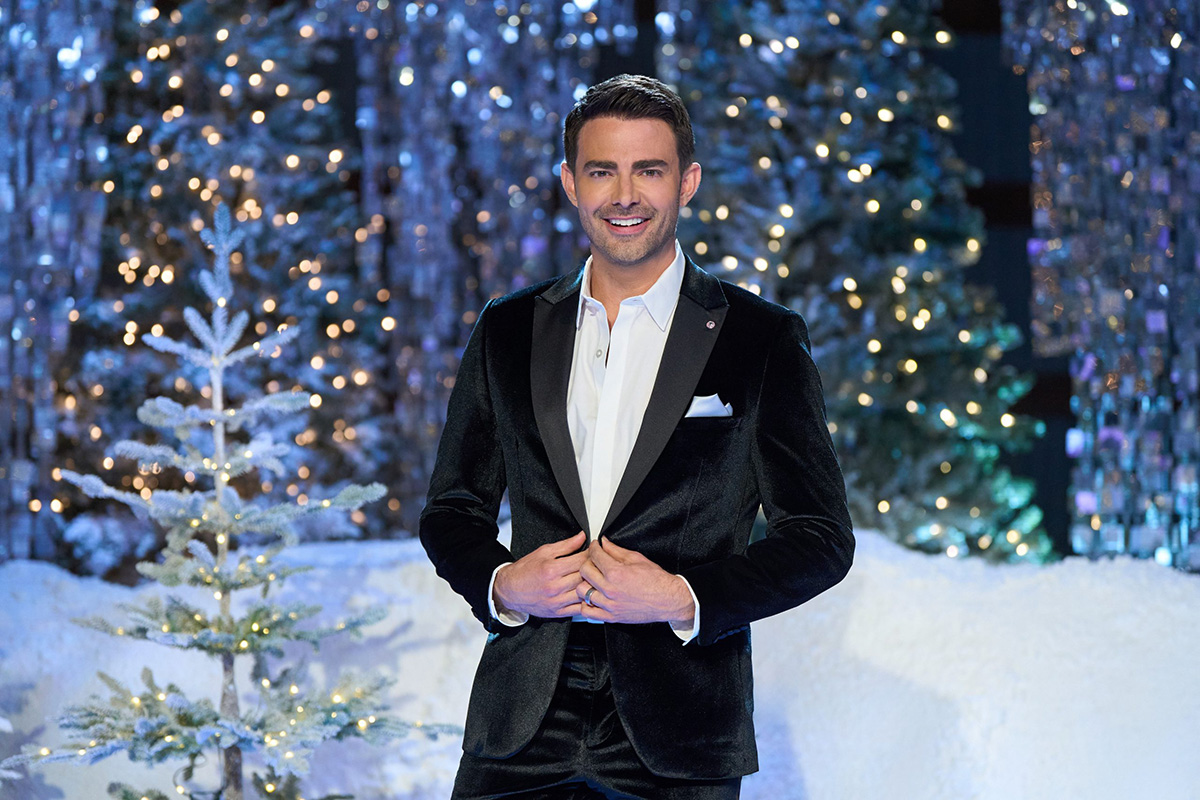
Jonathan Bennett believes there are two kinds of people in the world — those who love Hallmark movies and liars. And in Season 2 of Finding Mr. Christmas, which the Mean Girls star co-created with Ben Roy, Bennett is searching for Hallmark’s next leading man.
“It’s so fun for people because everyone in their life has someone they know that they think should be in Hallmark movies, right? The UPS driver, the barista at the coffee shop, the dentist,” Bennett says. “So we’re testing their acting abilities, we’re testing who they are, but we’re also looking for that star quality — the thing that makes them shine above everyone else. It’s almost something you can’t explain, but we know it when we see it.”
Season 2’s cast includes a former NFL player for the Green Bay Packers, a few actors, and a realtor. The 10 men compete in weekly festive-themed acting challenges, one of which included having to ride a horse and act out a scene with Alison Sweeney. The contestants were chosen from a crop of 360 potential men, and Bennett gives kudos to the show’s Emmy-nominated casting director, Lindsay Liles (The Bachelor, Bachelor in Paradise).
“She has a tough job because she has to find 10 guys that are going to be good reality television, but also have the talent to act, carry a scene, and lead a Hallmark movie eventually,” he says. To be the right fit for a Hallmark leading man, Bennett singles out five key characteristics: you have to be funny, charming, kind, have a sense of humor, and you have to do it all with a big heart.
Of course, Finding Mr. Christmas wouldn’t be Finding Mr. Christmas without its signature eye candy — something Bennett describes as “part of the job” for the contestants. “I can’t believe Hallmark let me get away with this. I dressed them as sexy reindeer and put them in harnesses attached to a cable 30 feet in the air, and they had to do a sexy reindeer photo shoot challenge,” he says with a laugh. “This season is just bigger and bolder than last. People are responding to not only all the craziness that we put them through, but also comparing and contrasting the guys in their acting scenes when we do them back-to-back.”
Season 1 winner Ezra Moreland’s career has been an early testament to the show’s success at finding rising talent. On seeing the show’s first winner flourish, Bennett says, “Now to watch him out in the world, just booking commercial after commercial and shining as an actor and a model, I think the show gave him the wings to do that. He learned so much about himself, and he took all that into his future auditions and casting. He just works nonstop. I’ve never seen an actor book more commercials and modeling gigs in my life.”
Bennett has been a star of plenty of Hallmark movies himself, including the GLAAD-award-winning The Groomsmen: Second Chances, which makes him a fitting host. Among those movies are 2020’s Christmas House, which featured the first same-sex kiss on the network and had a major impact on Bennett’s career as an openly gay man. “Hallmark’s been so great about supporting me in queer storytelling. But again, I don’t make gay movies for gay audiences. I make gay love stories for a broad audience, and that’s a huge difference, right? We’re not telling stories inside baseball that only the gay community will understand.”
He continues, “The backdrop of a Hallmark Christmas movie is very familiar to these people who watch. And so when you tell a gay love story, and you tell it no differently than a straight love story in that space, they’re able to understand. It’s able to change hearts and minds for people who might not have it in their lives.”
While Hallmark has become a major staple of Bennett’s career, he started off wanting to be a Broadway actor. And before the first season of Finding Mr. Christmas aired, Bennett took a break from TV to make his Broadway debut in Spamalot, replacing Michael Urie as Sir Robin and starring alongside Ethan Slater and Alex Brightman.
“That was my dream since I was five years old – then I booked a movie called Mean Girls, and everything kind of changes in your life. You no longer become a person pursuing Broadway, you become a part of pop culture,” Bennett recalls. “And to be honest, when I hit 40, I was like, ‘I’m probably never going to get to live that dream.’ And that’s okay, because I got to do other dreams and other things that were just as cool but different. So I honestly never thought it would happen.”
Bennett is still determined to make his way back on Broadway with the right role — he calls Spamalot the “best experience” of his life, after all — but he’s got another Hallmark show lined up with Murder Mystery House, which he co-created. The show was recently greenlit for development and intends to bring the Hallmark mystery movie to life. “It’s kind of like our version of The Traitors,” Bennett admits.
Looking back on both seasons, Bennett says that what makes Finding Mr. Christmas stand out in the overcrowded reality TV landscape is that everyone involved makes it with heart: “This isn’t a show where you’re going to watch people throw drinks in each other’s faces and get into big fights. The thing that has amazed me so much about this show, the more we’ve done it, is that every season, 10 guys come in as competitors, but they leave as a family and as brothers. That’s something you don’t get on any other network.”
Finding Mr. Christmas airs every Monday on Hallmark through December 20, with episodes available to stream on Hallmark+.

